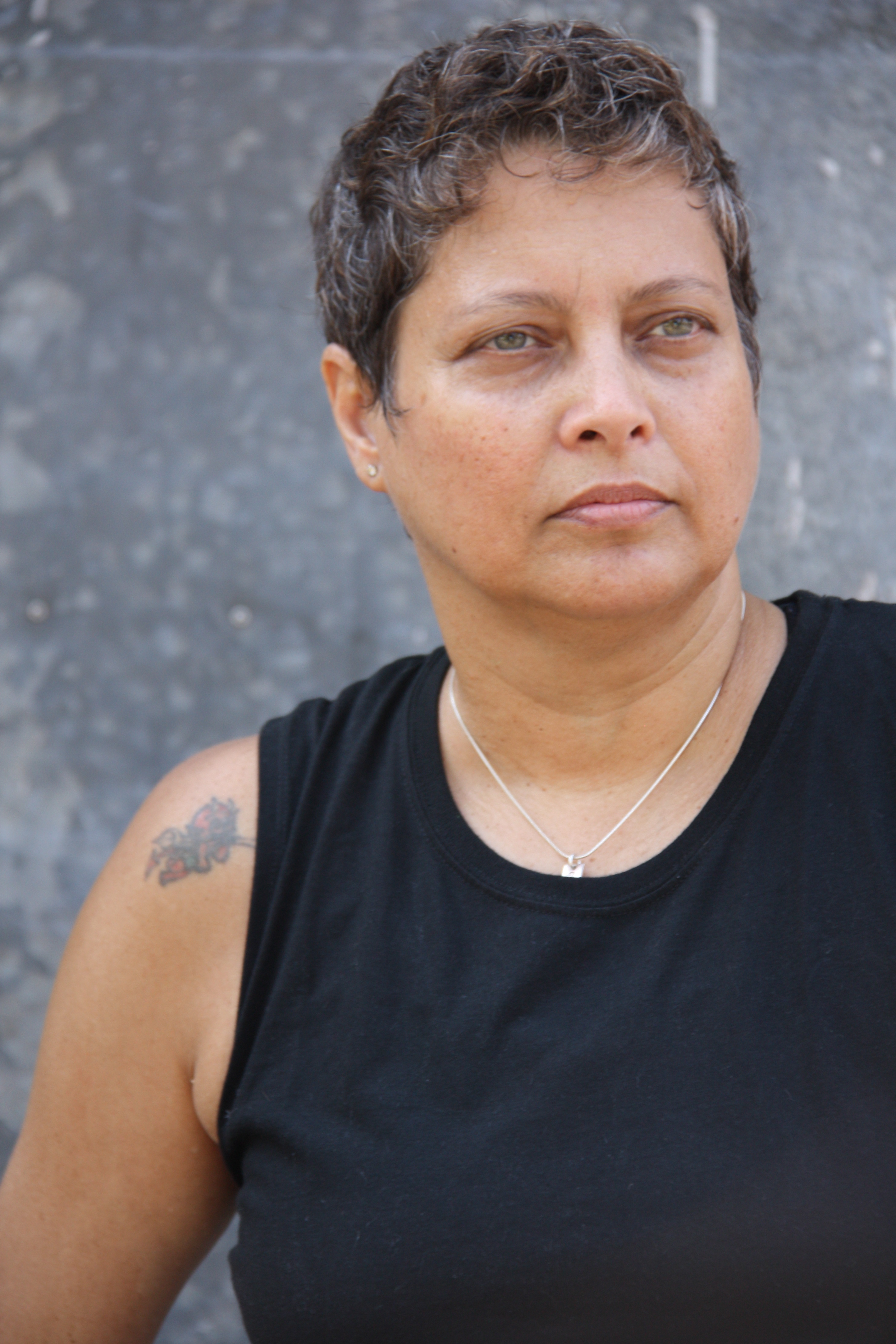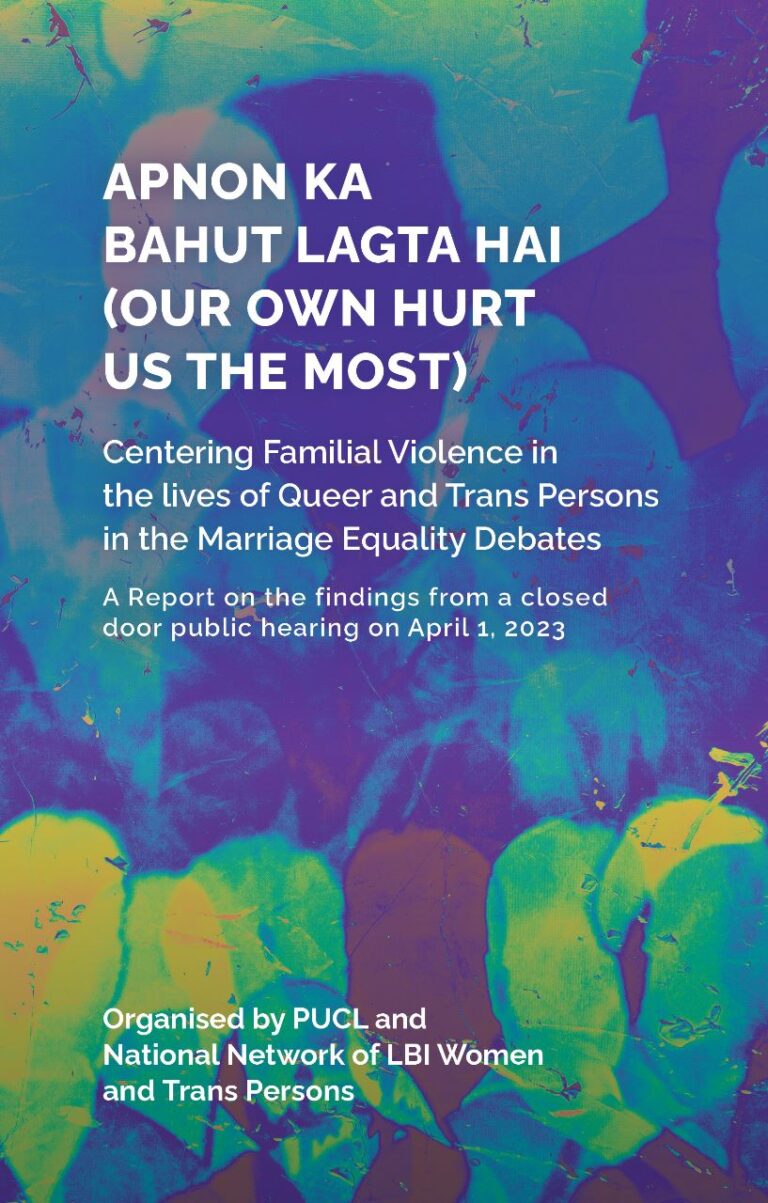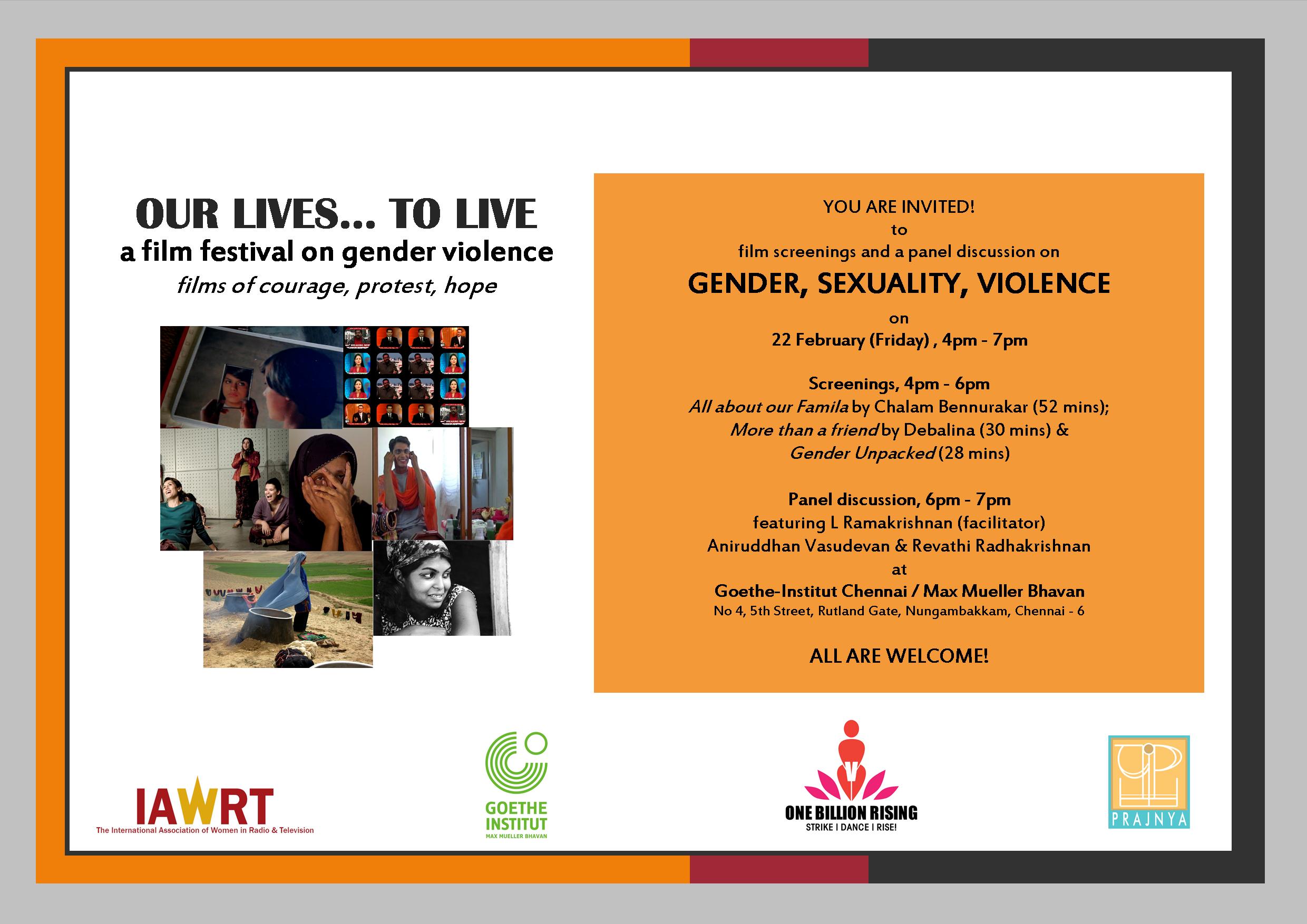Gender fluidity: my experiences and ideas

This article is only a personal reflection on some of my life experiences. I do not claim to be a philosopher or a sociologist who can answer all questions about how the society should deal with gender categories. Nevertheless, I venture to state it is commonsense that we need to look beyond the binary. I feel fortunate to be associated with support groups and organizations like Orinam and Nirangal that welcome all gender and sexual minorities without trying to label individuals.
We live in a society in which men and women are not yet treated equally in all situations. In most jurisdictions, we still need to implement affirmative action so women will have the same rights as men. It is not practical to disregard gender altogether. At the same time, I feel as a society, we need to recognize that not everyone fits into this binary model. Further, it is important for everyone to have the freedom to choose activities that interest them and express themselves in various social situations without undue constraints because of the gender assigned to them.
How are we going to do that? How are we going to ensure that everyone has the same rights but still protect women from harassment by men? We might not have answers to everything, but at the minimum, I think, we should be asking the right questions. As Maggie says in ‘The Opposite Sex … Is Neither!’, “a civilization is more well-known by the questions it asks than by the answers it comes up with” (re-quoted by Kate Bornstein). I would like to contribute my small bit to the advancement of our civilization by raising a few questions on gender and presenting my experiences here.
The day I was born everyone around me was happy and in a mood of celebration. In retrospect, I feel they were unduly concerned about certain aspects of my body which I don’t feel should determine how I live my life. Let me make it clear: it is not just my parents or family members who had the question “is it a boy or girl.” This is still the first question people ask while talking about a newborn in our society. I don’t find asking or answering this question a problem by itself, but I feel strange about the emotions and feelings that are commonly associated with this question. The first thing a mother or father asks is “do I have a boy or girl?” Even those parents who proudly say they will be equally happy with a boy or a girl will not readily accept that their child is not identified as either boy or girl at birth. Fortunately or unfortunately, the doctor decided that I was “male”. There was no ambiguity about my biological sex. So, people around me assumed that I would grow up to be a good “man”.
Some people are born with body parts they don’t feel comfortable with, but my concern is a bit different. Right from the earliest days in my life that I am able to remember, I never understood why so many things we are supposed to do in life are based on having or not having certain body parts. While it may be required to record what type of genitalia is present at birth—because it is not the same for every child—I don’t see any reason why a child should be dressed in a certain manner or given only certain types of toys to play with based on that. After all none of the toys meant for a child is not supposed to be operated using those very same body parts. Why then do we even distinguish between boys’ toys and girls’ toys?
What if there was a society which felt the blood group is very important and said all babies who have blood of type A must be made to wear red clothes and those who have type B should be made to wear blue clothes, and so on? You would think that is absurd, but I can argue that in various situations it would be more meaningful to differentiate people by blood group rather than by the genitalia. In most social and work situations, there is no legitimate reason for the other person to be concerned about your gender. For example, a person working in a bank is not expected to do anything as part of their professional work using the body parts based on which a gender is assigned to them. However, if someone in the bank meets with an accident, it would be more useful to know what type of blood they have and not what type of genitalia they have. So, why not name people in such a way that we know their blood group—and not their gender—by just hearing their name? Blood group is of course a hypothetical example. People have been treated differentially because of the circumstances they were born in—race, skin color and caste (specifically in India). We now agree that such differentiation is unethical, but as a society we have not done much introspection about the impact of assigning a gender to a child.
In one of the earliest observations a teacher has written in my school report, there is a remark which reads “does not mingle with other boys.” I do not have the opportunity to interview that teacher now. But from the language used, I can only guess that they decided I am a “boy” and I was supposed to mingle with other “boys”. My failure to do so was something unusual. I remember that I used to like many games and activities that were typically reserved for “girls” and did not feel comfortable being forced to participate only in “boys’” activities. I did not want to become a girl either. I could not understand why a child has to be a “boy” or a “girl”. I just wanted to be an “awesome child”: not an “awesome boy”, not an “awesome girl”. Society would not accept that and this created a lot of practical problems. I was lucky to be in a coeducational school. I am fortunate to have liberal-thinking parents, although they find my non-conformance to social norms like gender a challenge at times. While in school, even though boys and girls were generally seated separately, on occasion, I was allowed to join a group of girls for studies or other activities. Even then, certain boys would try to create problems for me because they felt I was trying to impress the girls, while I was just trying to explore our shared interests.
My biggest challenge was with sports. Boys and girls were separated for physical education instruction .Unlike girls, boys were expected to participate in aggressive and physically-demanding sports. Boys may—in a certain sense—have greater physical strength than girls, but there is no rationale why I should have been expected to participate in more aggressive sports just because I was assigned male. I could not join the girls as it might make them uncomfortable and teachers definitely felt it was inappropriate. But “boys” like me who did not exhibit such brute force during physical training were branded as “weak” and “girly” which was not only demotivating then but, in retrospect, must’ve also been insulting to girls as such. The strange thing is that certain boys would do anything and everything to avoid being told they are girly, and the teachers felt this was a good way of motivating them to do well in sports. Though I was not particularly keen on identifying as a girl, I cherished being different from the other boys. So, I started to deliberately act like I was physically weak. Consequently, I never took part in competitive sports in school. As an aside, it has taken me a long time to realize the importance of physical activity. I have tried the gym, and I now swim regularly to keep myself healthy.
While I was studying in high school, I woke up one day listening to the news on the radio. It was about the end of apartheid in South Africa. I was excited to hear the voice of Nelson Mandela. I was happy to hear that the nation had decided that they would no longer have separate bridges and public parks for blacks and whites. A few days later in our history class we studied about how Ambedkar struggled to end discrimination based on caste in India. While I was still feeling elated about the achievement of human equality in various societies, my school suddenly announced that boys and girls were to use different staircases from that day on. This was shocking to me. There was no reason why they should have come up with this new policy. Some teachers felt such segregation was required to improve the morality of the students. There were two staircases to access the classrooms in the second floor and they were at two ends of the building. The policy of segregation meant that on most occasions both girls and boys would have to walk much longer to reach their classrooms. Some people protested against it because it caused a lot of inconvenience, but I felt the imposition of this policy was a violation of my rights at a much deeper level: they infringed on my freedom to use a staircase because of how they perceived my gender. Students were using staircases only to climb up or come down the building. Even if there were any isolated cases of misbehavior they should have been dealt with on a case-by-case basis. I felt it was not only stupid but also inhuman for my school administrators to impose such a policy of segregation. Nevertheless I was a mute spectator at that time to this victory of Victorian morals over both common sense and basic rights.
Now I feel I must speak up against such irrational and inhuman practices. In a sense, I am still learning to be more assertive. More recently, when I was working in a corporate environment, I was given feedback that I should try to be like the other “men” so everyone could feel comfortable. While I was not assertive enough to protest against it, I just ignored the feedback. I was lucky that they did not bring up this issue again during the course of my work in that organization although I continued to be myself. I am not sure if I responded to it in the best possible manner, but at least I did not allow others to dictate how I should express myself.
I have been much happier during the last few years primarily because I got involved in the LGBTQI movement. I now interact with people who have similar interests. However, not everyone working for the welfare of gender and sexual minorities understands or accepts fluidity. Sometimes I happen to meet people who want to put me into a category like gay or trans. There is a clear binary into which the world wants to fit people like me. For example, even our languages don’t have a common third-person singular pronoun that is not gendered.
I am just a person. Why do others need to categorize me as either “he” or “she”? I feel gender is fluid: it can change based on time or situation. While I understand that for some of my transgender friends, it is very important for them to transition to their target gender, I would want people to understand that I don’t have a target gender. In my exploration of life, as well as my understanding of gender, my purpose is not to reach a destination but to just enjoy the journey. I am not here to discover an identity that fits me. I just want to keep exploring ways of expressing myself that makes me feel satisfied; without harming others, of course.
Some people think that fluidity means they can fit me into whatever identity they feel best suits me. Typically, I am asked, “So if you are not trying to become a woman, why do you want to wear women’s clothing?” There are multiple ways of looking at it: one perspective is, what is wrong if I dress like a woman? That is what I feel like doing at the moment. Another perspective is, why do men and women need to dress differently in the first place? By this perspective I also want us to question the relevance of gender. While most of the times I try to explain, sometimes I just ask them back: “How does it bother you? In what way is my dress affecting you?”
I am much happier now that I have started accepting myself. I feel I can share my experiences in the hope that it could benefit others. Most people live with gender dysphoria; they are not comfortable with at least some aspect of gender assigned to them. For example, a girl who is not allowed to study in an out-of-the-town college because no other girl in the neighborhood has done that or a boy who is discouraged from wearing nail polish because “boys” are not supposed to do that. I want to reiterate that the right to gender expression is a basic right—an integral part of the fundamental right to freedom of speech and expression and the fundamental right to equality. This is something that should concern not just certain individuals like me who don’t want to be identified as male or female. This is something that should be of concern to every single human being. Sometimes, people ask me what is so significant about wearing nail polish? Why do you have to talk about fundamental rights here? Parents telling their child not to wear nail polish because of the gender assigned to the child are at once violating both the right to equality and the right to freedom of speech and expression the child is entitled to. The body parts of the child have nothing to do with how the nails can be colored. This is as absurd as saying that a child should never wear a red shirt because he or she has long fingers. Some people might argue that though arbitrary and absurd, such a parental injunction would not by itself violate constitutional rights as no serious harm is done. It is not just that the child cannot color their nails but the consequence is that the child cannot participate in several meaningful social interactions just because of the gender assigned to them. Imposing norms such as use of nail polish, prevents the child from expressing their own identity. Therefore, I feel this is a violation of fundamental rights.
One other personal question that I find difficult to answer is “What is your gender identity?”. To those who insist on me mentioning a label, I usually say “genderfluid”. However, I don’t think there is any label that exactly describes me. I personally view gender as a performance rather than as an identity. I tell people, if I look feminine to you, call me “she”, if I look masculine to you, call me “he”. I don’t care what you think about my identity as long as you treat me with respect and dignity. I have a problem with someone only when they try to interfere with my right to express myself. In fact, I don’t even feel gender should have much relevance in my life. As long as I have the right to wear clothes of my choice, participate in activities that interest me, and associate freely with people who have similar interests, it does not matter to me if others think I am man, woman or someone of another gender.
A Tamil version of this piece translated by Arthi Vendan is available on eanil.com




![[story] Strangers and Unspoken Connections](https://orinam.net/wp-content/uploads/2023/11/Amalstory-1.jpeg)
Thank you for this thought-provoking, well-written and well-argued article. I fully agree that any individual should be free to express him/herself as h/she chooses, provided of course that it is not offensive to other people.
Well-written truthful experience Vikram. Congrats. My deep-felt wishes to you to progress in the manner you wish in life and be a model of peace and happiness through self-acceptance.
It is unfortunate that what one wears, watches, eats, drinks, believes in and learns in life is often imposed externally.
A well-written truthful experience Vikram. Congrats. My deep-felt wishes to you to progress in the manner you wish in life and be a model of peace and happiness through self-acceptance.
It is unfortunate that what one wears, watches, eats, drinks, believes in and learns in life is often imposed externally.
Thanks Shankar for your comments.
Further, I would like to say I am not the only person talking about these issues. Here are a few other narratives that I can really relate to and present valuable perspectives on non-binary gender:
“This is not your conventional trans narrative. This is not a story about being born in the wrong body. This is the story of being born in the wrong world. This is the story of being told who we are without our consent. This is a story of a gender that refuses to be defined by a body.”
Alok Vaid-Menon (http://www.mtv.com/news/1962946/gender-non-conforming-identity-trans/)
“Genderqueer model Rain Dove doesn’t care if you think she’s a man or a woman” (http://www.afterellen.com/genderqueer-model-rain-dove/10/2014/)
I am really happy if my narrative inspires others. At the same time, I would like to state that non-binary gender is real, and I am not the only one who says so.
thanks so much for sharing this powerful piece!
powerful.